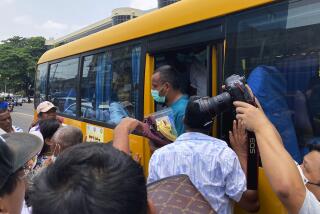PLATFORM : Nobelists Plea for End to Burmese Suffering
- Share via
The military government of Burma has engaged in massive violations of human rights, particularly during the past four years. The military rules by force and terror. Not even a semblance of respect for political and civil rights exists.
The lack of broader public awareness of what is happening in Burma is a source of strength and comfort to the military rulers. They have made prodigious efforts, banning foreign journalists and even changing the country’s official name to Myanmar to prevent a wider audience from learning the following facts.
In 1990 elections, despite strict controls on campaigning and the house arrest 10 months earlier of the leaders of the opposition National League for Democracy (NLD), NLD candidates won 392 out of 485 seats in Parliament. The pro-military National Unity Party won 10 seats.
The military prevented democratically elected leaders from taking office. Eighty of the elected NLD candidates were imprisoned, and three have died in detention. Many others are in hiding or exile.
Dissidents are routinely imprisoned and tortured. In the second half of 1989, Amnesty International estimated that more than 3,000 persons were imprisoned for political reasons, and identified 19 detention centers where torture was practiced.
During January and February of 1990 as many as 500,000 Burmese were forcibly relocated in new areas. Communities identified as particularly supportive of the opposition National League for Democracy were targets of these relocation programs.
In 1991 civil servants were required to respond to a questionnaire assessing their loyalty to the military regime. Thousands of employees who failed to respond “correctly” were purged from their jobs.
Many thousands of Burmese have been pressed into forced labor to work for the military. The regime has routinely rounded up people from cinemas, tea shops and homes and forced them to transport supplies and to act as human minesweepers in military operations.
Buddhist monks have been special targets of military repression. In October, 1990, the military ordered dissolution of all monastic orders except for the government-controlled Sangha Supreme Council; monks have been killed and wounded in military attacks on monasteries.
We call on the Burmese military government to refrain from further violations of human rights and to transfer power to democratically elected representatives.
Until the Burmese regime takes such steps, we call on other governments to prohibit sales of military equipment; halt economic aid, and impose sanctions on trade and investment.
More to Read
Sign up for Essential California
The most important California stories and recommendations in your inbox every morning.
You may occasionally receive promotional content from the Los Angeles Times.













